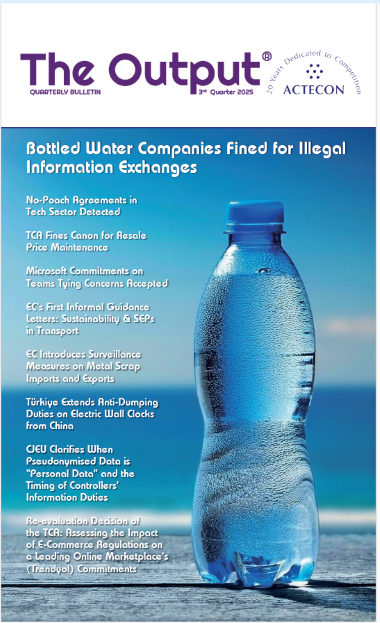Amendments to the Turkish Competition Law
| Competition Law

Amendments to the Turkish Competition Law
Article by Bahadır Balkı, Ayberk Kurt and Alper Karafil
The Turkish Parliament has approved the long-awaited proposal for an amendment to the Competition Law (“Amendment”) on 16 June 2020 and it came into force after being published in the Official Gazette of the Republic of Turkey on 24 June 2020.
In terms of the respective amendments, (i) introduction of the “settlement” mechanism and (ii) the fact that the significant impediment of effective competition” test will be applied instead of the dominance test within the scope of the merger/acquisition evaluations are completely new two changes compared to the previous period. It can be said that the issues other than these amendments are aimed at providing/strengthening the legal basis of the practices which is already de facto implemented by the Turkish Competition Authority (“TCA”).
In this regard, the most important changes introduced by the amendments to the Competition Law are as follows:
Settlement
Within the scope of the Amendment, one of the most important and entirely new amendment is the opportunity of a “settlement” between the TCA and the companies within the scope of an investigation.
Within this context, companies will have the opportunity to settle by applying to the TCA until the notification of the investigation report. In order for the company to benefit from the settlement mechanism, the company subject to investigation must declare to the TCA that it has accepted that it has committed a violation within the ongoing investigation (until the notification of the investigation report) and waive from all its subsequent litigation rights. In this case, in return for this settlement of the relevant company, the amount of the administrative fine imposed on can be reduced by up to 25% by the TCA.
Significant Impediment of Effective Competition Test (SIEC Test) on Evaluation of Mergers/Acquisitions
The second of the entirely new amendments concerns the implementation of the "significant impediment of effective competition (SIEC)" test adopted in EU law, instead of the "dominance test" which was applied in the previous period during the approval of the TCA for the mergers and acquisitions subject to notification.
In virtue of the new assessment test brought with this amendment, in addition to the transactions resulting in the creation of a dominant position or the strengthening of the current dominant position, transactions which may reduce competition significantly (without seeking a dominant position condition) may also be prohibited.
Commitment Mechanism
The Amendment sets out the commitment mechanism included in the EU legislation. Within the scope of previous application, full-fledged investigations initiated by the TCA were required to continue to the last, and in case that a violation was determined, administrative fine were required to be imposed on the companies causing the violation. After the relevant amendment, the companies concerned will be able to benefit from the commitment mechanism by making commitments to address current competitive concerns. In this case, the TCA will be able to decide not to initiate full-fledged investigation or to terminate the investigations conducted against the companies or associations, whose commitments are deemed sufficient in terms of adequacy and timing.
It is also possible to encounter decisions thus far made by both the TCA and the Council of State in practice regarding this subject. For example, in the Esgaz (1) and Çevko (2) Decisions, the TCA decided not to open an investigation as a result of the commitments given by the undertakings in respect of taking steps to eliminate the anti-competitive effects of the behaviors that may constitute a violation. It can be seen in the foregoing decisions that the TCA applied the commitment mechanism in practice. With the respective amendment, it may be considered that the TCA’s authority on this matter is clarified.
Behavioral and Structural Remedies for Anti-Competitive Conducts
With the enactment of the Amendment, the TCA shall be entitled to impose structural remedies (selling/divestiture of a particular asset or partnership interest to an independent third party for the re-establishment of competition, etc.) against the companies that have violated the Competition Law. This authority is restricted with the statement “Structural remedies can be applied only in cases where the behavioral remedies imposed previously did not yield results” in the relevant provision to be applied in cases where the TCA cannot obtain results from applying of behavioral remedies. In such a case, the companies will be given at least 6 months to comply with the structural remedies after it is determined with a final decision that the behavioral remedies did not bring to a successful conclusion.
For instance; issues such as the demerger of OYSA, a cement JV between two competitors OYAK Group and SABANCI Group, by the TCA (3) or the TCA’s decision obliging Erdemir to sell its shares in Borçelik (4) can be listed as situations where the TCA applied structural remedies prior to this amendment. With the Amendment, the basis of such structural measures is disambiguated/strengthened in the Competition Law.
On-the-Spot Inspections
Another issue brought by the Amendment concerns the limits of the TCA’s on-the-spot inspection powers. With the relevant amendment, the TCA will be able to conduct an inspection on the company computers and any data kept in the information systems of undertakings and collect copies and physical samples of them. Currently, the TCA has already been able to examine the companies’ servers and even the correspondences made via WhatsApp.
In this regard, the respective amendment aims to strengthen legal basis of the TCA’s inspection power by clarifying the wording in the relevant provision. At this point, it should be emphasized that yet the TCA expressed with a public statement that during the inspections, personal phones and tablets will not be obtained and examined.(5)
De Minimis Principle
One of the important changes made by considering the EU legislation is related to the introduction of the “de minimis” application. The Amendment envisages that except for severe violations such as price fixing, market or customer allocation and restriction of the supply (i.e. hard-core restrictions), the TCA will not initiate a full-fledged investigation against the violations not exceeding the market share and turnover thresholds that will be announced with a Communiqué to be determined by the TCA.
At present, the TCA managed violations that could not have a significant impact on the market (among bakers, driving courses, small businesses, chamber of engineers, etc.) by taking decisions serving as a warning (but not initiating a full-fledged investigation (6)). With the Amendment, the legal basis in order for de minimis principle to be applied will also be provided.
Conclusion
With the concerned Amendment, a full compliance with the EU legislation within the scope of Competition Law is aimed. In addition, it is targeted to eliminate uncertainties/debates arising from the Competition Law and in this context, certain provisions are amended in order to ensure certainty and explicit legal basis is provided for the already applied practices by the TCA.
Footnotes
1. The TCA’s Esgaz Decision dated 04.04.2019 and numbered 19-14/189-85.
2. The TCA’s Çevko Decision dated 11.11.2009 and numbered 09-54/1298-329.
3. The TCA’s OYSA Decision dated 3.10.2006 and numbered 06-69/930-267.
4. The TCA’s Flat Steel Decision dated 16.6.2009 and numbered 09-28/600-141.
5. For the Turkish version of the respective public statement, please see
http://www.rekabet.gov.tr/tr/Guncel/kamuoyu- aciklamasi-292c0e7644a7ea11811b00505694b4c6.
6. As an example of the decisions that the TCA warned the undertakings to terminate the violation instead of initiating a full- fledged investigation in practice for violations that do not have a significant impact on the relevant market, please see the TCA’s “Raw Meatballs” Decision dated 10.01.2019 and numbered 19-03/13-5; Bolu Bakeries Decision dated 25.11.2010 and numbered 10-73/1508-576; Kocaeli Bakeries Decision dated 03.04.2014 and numbered 14-13/240-106.







